The Rediff Special/ Archana Masih

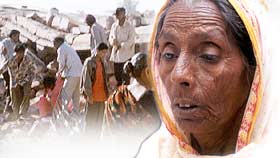
Indian Naval Hospital Ship Asvini, Colaba
Special Emergency Ward, Earthquake -- January, 2001
Bed No 7
As the pouch slowly drips blood into her left arm, Hawa Bai Adam is stoic in her grief. The doctors say her haemoglobin count has to be built up before she can undergo surgery. She has no control over her lower limbs, but is brave enough to smile when asked about her paraplegic condition.
But one has to be blind not to see the sad, faraway look in those dark, bright eyes.
"My 20-year-old daughter has lost her two-and-a-half-year-old son. He died, clutched to her chest," says Hawa Bai's sorrowful mother.
By now, Hawa Bai's eyes have given way to a silent trickle of tears, moistening the white pillow.
"I was feeding him breakfast," comes her feeble voice. "I grabbed him before I fell and the roof came down on both of us."
A few hours later, her neighbours in the village of Khari Rehar, near Gandhidham, were able to pull Hawa Bai from under the debris. Her open hands, stretched out above her head, were clear indication of her position in the rubble.
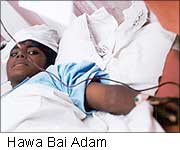 The next day, Hawa Bai -- who hails from a family of salt labourers -- was sent to Bombay with her mother on the INS Ganga. She does not know when she will return and longs for her daughter who is being looked after by her neighbours and her husband, who is currently in a hospital in Gandhidham.
The next day, Hawa Bai -- who hails from a family of salt labourers -- was sent to Bombay with her mother on the INS Ganga. She does not know when she will return and longs for her daughter who is being looked after by her neighbours and her husband, who is currently in a hospital in Gandhidham.
The INHS Asvini's special ward is filled with similar heartrending experiences. Where the pain in its patients's hearts by far exceeds their physical injuries.
India's oldest naval hospital is, at the moment, home to 29 patients from Gujarat. Two dedicated teams of surgeons, medical officers, medical assistants and nurses attend to their needs. Officer Sanjiv Badhwar, who has been with the navy for 17 years, is in charge of the special ward. He says the doctors on the INS Ganga had to do an amputation on board because they feared the wound would become gangrenous before the ship made it to Bombay.
The hospital, meanwhile, had already prepared itself to receive the quake's victims. "We had a 100 bed ward ready on January 26 itself as we were anticipating casualties," says Surgeon Commodore V K Singh, VSM, Executive Officer, INHS Asvini. They have also sent three medical teams to Kutch to aid in the relief effort.
He adds that, after the acute stage is over and the patients's conditions have stabilised, they could be shifted to civil hospitals. "We will liaise with civil hospitals and decide accordingly."
"The people at the hospital have been extraordinary," says Niranjan Joshi, whose mother occupies the bed besides Hawa Bai. "I was there on the INS Ganga and saw how Dr Manil Patel did not sleep a wink for 36 hours! We are lucky to be here, there are many who may not even know what may be wrong with them."
Bed No 8
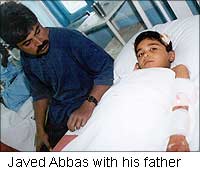 Dr G K Sabharwal fills Javed Abbas's palm with a handful of Eclair chocolates. At five years, Javed is the youngest patient in the ward and is being treated for a fractured hip. His father, just back from making a long distance call, is anxious to return home. On the one hand, he is worried about his son. On the other, he fears that what little is left of his house and belongings will be pillaged by wandering marauders.
Dr G K Sabharwal fills Javed Abbas's palm with a handful of Eclair chocolates. At five years, Javed is the youngest patient in the ward and is being treated for a fractured hip. His father, just back from making a long distance call, is anxious to return home. On the one hand, he is worried about his son. On the other, he fears that what little is left of his house and belongings will be pillaged by wandering marauders.
"I wasn't home," he says. "My wife ran out with the kids, but Javed got trapped under a balcony. She pulled him out and that broke his hip." The unshaven father adds that his son, who also has an open wound in the head, was equally eager to return to his mother. "Each time I go out and return, he asks me if I've brought a tempo in which he can go home."
Doctors at the hospital say most earthquake patients in the ward have spinal or orthopaedic injuries. Some were battling badly infected wounds. Patients are also getting psychiatric counselling to help them deal with the trauma.
"Most of them are under acute stress which, if not treated, can lead to a critical debilitating condition," says Dr Kaushik Chatterjee. The psychiatrist, who had also assisted in the 1993 Orissa floods, says he has never seen cases of such large scale devastation before. But he is encouraged by the fact that none of the patients he has interacted with during the present crisis have lost the will to live.
The Intensive Care Unit
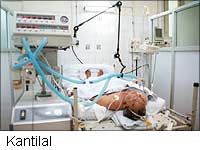 Behind the quiet doors of the intensive care unit on the first floor lies 62-year-old Kantilal. On ventilator support ever since he was admitted, his medical file lists the cold fact -- CRITICAL. With a clipper attached to his skull to relieve the pressure on his cervical spine, Kantilal is perhaps the most seriously injured patient among the earthquake victims at the INHS Asvini.
Behind the quiet doors of the intensive care unit on the first floor lies 62-year-old Kantilal. On ventilator support ever since he was admitted, his medical file lists the cold fact -- CRITICAL. With a clipper attached to his skull to relieve the pressure on his cervical spine, Kantilal is perhaps the most seriously injured patient among the earthquake victims at the INHS Asvini.
The killer quake has left him with no movement in or control over his arms and legs. Doctors say the severely injured man, who was brought to the hospital in a brace, had received good first aid treatment in Gujarat. If not for that initial treatment, his condition could have been much worse.
With a broad tube in his mouth and several other gadgets monitoring his heart and body, Kantilal looks helpless. Yet, say his doctors, the important thing is that he has survived. "Life and Limb. First comes life, then limb," explains a medic.
'We put her on a ladder, tied her with saris and carried her to the main road'
Nirmala Joshi had lived through the 1956 earthquake. Which is why, when the earth started trembling midway through her morning puja, she screamed at her family, "Run!" Just as she rested her right arm on the floor to prop herself up, the roof collapsed. Her neighbours rescued her, but her mother still lies buried in the ruins of her 180-year-old home in old Bhuj.
Nirmala's injury has left her paralysed hip downwards.
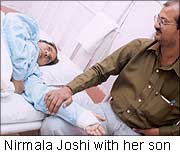 Her son says they spent the night of January 26 sitting on rubble. Realising his mother's pain was intense and no medical help was in sight, he used a wooden ladder as a stretcher. "That short distance to the main road, that would otherwise take us a few minutes by scooter, took almost two hours because of the destruction," he says.
Her son says they spent the night of January 26 sitting on rubble. Realising his mother's pain was intense and no medical help was in sight, he used a wooden ladder as a stretcher. "That short distance to the main road, that would otherwise take us a few minutes by scooter, took almost two hours because of the destruction," he says.
Like many others in the ward, Nirmala also wants to return home. The thought of a devastated Bhuj -- what many have already termed a ghost town -- does not deter her. "I am confident I will be fine. Soon," she smiles from her hospital bed.
She may have lost control of her limbs for now, but Nirmala Joshi hopes she will rise again. And, with the help of spirited people like her, so will Bhuj.
Photographs: Jewella C Miranda. Design: Dominic Xavier.
The Complete Coverage | List of earthquake sites
Back to top